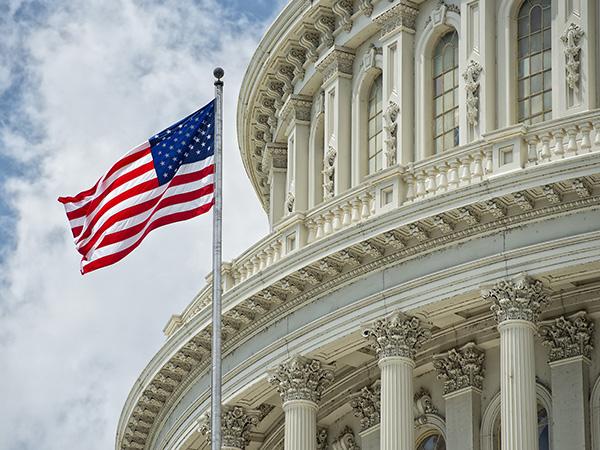Following a hotly contested election, Donald Trump is once again president and returned to the White House on January 20, 2025. He has done so with the backing of a new Republican majority in the United States Senate and the House. The new Administration and Congress have hit the ground running, with a mandate-driven push from the GOP in pursuit of their agenda.

2024 Election Analysis
Post-Election Analysis

How will the results of the November 2024 elections shape policy in many areas, including energy & sustainability, US-Canada cross-border issues, taxation, health care, international trade, infrastructure, consumer product safety, and financial services?

Host Bridgette Keller dives into potential health care policy changes on the horizon following the November 2024 election. She is joined by Alex Hecht, ML Strategies Executive Vice President & Director of Operations, Washington, DC, to unpack the impact of an all-Republican government and what stakeholders can expect in 2025.

What will a second Trump administration’s trade priorities will look like and how will a Republican-controlled Congress will play a critical role in advancing or modifying those policies?

What is the outlook for energy policy in light of Trump’s recent nominations and the composition of the incoming Congress? We discuss the fate of the IRA, the prospects for energy project permitting reform, and areas of bipartisan support.
2024 Post-Election Analysis: Trade and Tariffs
As Donald Trump returns to the White House with a Republican-controlled Congress, navigating the complexities of US trade policy will be a pivotal challenge. With ambitious goals for reshoring manufacturing, expanding tariffs, and securing bilateral trade deals, the administration will face both opportunities and obstacles.
Trade Agenda for Donald Trump’s Second Term and the Role of the 119th Congress
In his second term, Donald Trump's policies will remain central to his economic strategy, and he has already begun to lay the groundwork, announcing his intention to impose a 10 percent tariff on all imports from China and a 25 percent tariff on goods imported from Canada and Mexico on his first day in office.
Read More About Donald Trump's Trade Agenda for his Second Term
Trade Priorities for the Second Trump Term
How will the President-elect's nominations shape trade policies including rebuilding the US manufacturing sector, tariff policies and protectionism, bilateral trade deals over multilateral agreements, and supply chain resilience and national security.
Read More About the Trump Administration Energy Policy
Learn More About Trade and Tariffs
2024 Post-Election Analysis: Energy & Sustainability
President-elect Donald Trump has made it clear that on Day 1 he plans to immediately reverse pauses on all liquified natural gas (LNG) export permits to accelerate oil and gas production and “lower energy prices.” Trump will push for more oil drilling on federal land and we also expect that the administration and Congress to move quickly on revamping DOE’s role in LNG export licenses under the Natural Gas Act.
Congress' Upcoming Role in Energy & Sustainability
Republicans have a controlling majority in both House and Senate, giving them the opportunity to enact a broad agenda. Finalization of the House is still pending, but House Republicans will likely see a seven-seat majority, while in the Senate, they will have a 53-47 majority but fall below 60 seats to block a filibuster. With these relatively thin margins, Republicans cannot afford many defections.
Read More About Congress' Upcoming Role in Energy & Sustainability
Agency Leadership in Energy & Sustainability
President-elect Trump has named Chris Wright, currently CEO of Liberty Energy, an energy services company headquartered in Denver, as his nominee for Secretary of Energy. Wright’s actual positions may be more nuanced, however, given Liberty’s investment in Fervo, an advanced geothermal company, and Wright’s position as a board member on Oklo, a small modular nuclear company.
Read More About Agency Leadership in the Energy & Sustainability Sector
2024 Pre-Election Analysis Topics

How will the outcome of the 2024 presidential election impact the legislative and regulatory landscape in energy & sustainability policy? We explore the impact of a Kamala Harris or Donald Trump presidency in the legislative and regulatory landscape in a variety of areas.

We explore some of the most pressing cross-border issues between the United States and Canada that will be tackled by the next administration and 119th Congress, focusing on energy, infrastructure, tax, trade, and technology.

We explore some of the key tax policy proposals put forth by former President Donald Trump and Vice President Kamala Harris as they seek the presidency and highlights what we can expect on Capitol Hill from key leaders on tax policy in the 119th Congress.

We explore the different health care priorities that may be pursued by the presidential candidates Donald Trump and Kamala Harris in the latest edition of our 2024 Pre-Election Analysis series on how the November 2024 election will impact the legislative and regulatory landscape.

What are the international trade priorities that may be pursued by the presidential candidates Donald Trump and Kamala Harris? We take a deep dive into international trade priorities In the latest edition of our 2024 Pre-Election Analysis series on how the November 2024 election will impact the legislative and regulatory landscape.

How will the 2024 election results impact infrastructure? We join our partners in the Public Finance Practice at Mintz to discuss the potential implications of the 2024 general election for infrastructure policy for the incoming presidential administration and 119th Congress.

How will the 2024 election results impact consumer product safety? Read about how the upcoming November elections could shape consumer product safety laws and regulations, depending on the outcome of the presidential race and whether one party takes control of Congress.

How will the 2024 election results impact financial services policies? We explore the implications of the 2024 election for financial services policies of the next presidential administration and 119th Congress.
2024 Pre-Election Analysis: Energy and Sustainability
The 2024 election has the potential to usher in significant changes that could dramatically reshape the nation’s energy policy. With growing concerns over climate change, economic growth, and energy security at the forefront, the outcome of this election at both the presidential and congressional levels will dictate to what degree the United States pursues aggressive renewable energy initiatives, embraces new technologies, or continues to support traditional fossil fuel industries. The stakes are high with implications that extend far beyond the political sphere and regulated industries, communities, and the environment nationwide.
Harris Administration Energy Policy
Vice President Kamala Harris' energy policy would largely build upon the foundations laid during the Biden administration, characterized by promoting clean energy, addressing climate change through international cooperation, advocating for environmental justice, and supporting a robust regulatory agenda to protect the environment and public health.
Read More About the Harris Administration Energy Policy
Trump Administration Energy Policy
In a second Trump administration, energy policy would likely continue to reflect the priorities and approaches seen during his first term, which emphasized deregulation, promoting domestic production, and reducing dependence on foreign energy sources.
Read More About the Trump Administration Energy Policy
Learn More About Energy and Sustainability Policy
2024 Pre-Election Analysis: US-Canada Cross-Border Issues
The relationship between the United States and Canada remains a cornerstone of North American stability and prosperity. However, the landscape of cross-border interactions is evolving rapidly, influenced by a combination of economic shifts, technological advancements, and environmental concerns.
Based on historical positions, we can anticipate where Republican candidate Donald Trump and Democratic candidate Kamala Harris might steer US policies on cross-border issues if elected. Congressional action will hinge on which of the parties controls the House and Senate. A divided government could lead to stalemate or compromise, impeding either party's ability to fully implement their priorities.
Learn More About US-Canada Cross-Border Issues
2024 Pre-Election Analysis: Tax Issues
This pre-election analysis from ML Strategies explores some of the key tax policy proposals put forth by former President Donald Trump and Vice President Kamala Harris as they seek the presidency and highlights what we can expect on Capitol Hill from key leaders on tax policy in the 119th Congress.
Whether you’re a concerned taxpayer, a business owner, or just interested in how politics might affect your organization’s financial landscape, understanding these tax policy debates is crucial as you prepare for the future.
2024 Pre-Election Analysis: Health Care Issues
The next administration and the 119th Congress have the potential to shape the future of the Affordable Care Act (ACA), Medicare (including the new Medicare drug price negotiation program), Medicaid, abortion and contraception rights, pharmacy benefit manager (PBM) reform, and health equity issues, among other issues.
This pre-election analysis from ML Strategies explores the different health care priorities that may be pursued by the next administration and 119th Congress.
Learn More About Health Care Issues
Pre-Election Analysis: International Trade
International trade has emerged as a pivotal issue, with presidential candidates Vice President Kamala Harris and former President Donald Trump navigating a complex web of global trade dynamics, from shifting supply chains and geopolitical tensions to emerging markets and trade agreements as they make their case for election. Engaged voters will be keenly aware that the approach taken by the winner of the presidential contest will have profound implications not only for the US economy but also for the nation’s standing in the global arena.
In this installment of ML Strategies’ Pre-Election Analysis series, we will delve into how international trade is influencing the electoral debate, examining the presidential candidates' positions as well as the trade priorities of the two political parties on Capitol Hill as they vie for control of the US Senate and US House of Representatives in the 119th Congress.
What is the International Trade Policy in a Harris Administration?
The Vice President has expressed a desire to build strong alliances and collaborate with international partners. And if elected, we may see her seek to resolve trade disputes through negotiation rather than escalating tariffs as Donald Trump has proposed.
What Could International Trade Policy in a Second Trump Administration Look Like?
If Donald Trump is reelected president, his second term would continue his “America first” approach to international trade, marked by unilateral actions, aggressive negotiation tactics, and a focus on reducing the trade deficit and protecting US industries. His policies would emphasize nationalism and protectionism, with less attention to multilateral cooperation and environmental issues.
Learn More About International Trade
2024 Pre-Election Analysis: Infrastructure
We join with our partners in the Public Finance Practice at Mintz to discuss the potential implications of the 2024 general election for infrastructure policy for the incoming presidential administration and 119th Congress.
What is the Infrastructure Policy in the Harris Administration?
Vice President Harris can be expected to stake out positions on infrastructure policy that continue and expand upon the goals of the Infrastructure Investment and Jobs Act (IIJA.) The Biden-Harris $1.2 trillion IIJA authorized spending over a five-year period, starting in fiscal year 2022 and extending through September 30, 2026. A top priority for a Harris administration would be any remaining unspent funds after September 30, 2026, would need to be reauthorized or addressed through new legislation.
What is the Infrastructure Policy in a Second Trump Administration?
The Donald Trump administration would focus his infrastructure development priorities through the lens of streamlining regulations, public-private partnerships aimed at leveraging private sector investment in infrastructure, energy infrastructure, and border infrastructure with a priority on strengthening barriers and surveillance systems as part of his broader immigration policy.
Learn More About Infrastructure Policy
2024 Pre-Election Analysis: Consumer Product Safety
Like other spheres of federal public policy, consumer product safety laws and regulations could be profoundly impacted by the upcoming November elections. A Congress controlled by one party will likely have a very different legislative agenda than one that is under divided control. Moreover, whoever sits in the White House will likely determine the regulatory and enforcement posture of the US Consumer Product Safety Commission (CPSC or Commission), which is shaped by the political makeup of its five presidentially appointed, Senate-confirmed commissioners, including the chair of the Commission.
What is the Consumer Product Safety Commission Legislation and Oversight in the 119th Congress?
With both the House of Representatives and Senate under razor-thin margins of partisan control, the likelihood of one or both bodies flipping is highly probable in November. If Democrats win control of the House and Republicans take back the Senate, the legislative agendas of each body will likely change, though the ultimate legislative outcome is not likely to differ greatly from the current state of a divided, largely gridlocked Congress.
Read More About Consumer Product Safety Commission Legislation and Oversight in the 119th Congress
What is the Consumer Product Safety Commission and Enforcement/Compliance Actions in a Harris or Trump Administration?
Under the CPSA, the five commissioners are all presidentially appointed and Senate-confirmed; by law, no more than three commissioners can be affiliated with one political party. Because the commissioners’ seven-year terms are staggered, the party in control of the White House strives to (eventually) control the CPSC by a 3-2 margin through presidential appointments, subject to the Senate’s confirmation process, which has become increasingly partisan and contentious over the years.
Read More About the Consumer Product Safety Commission and Enforcement/Compliance Actions in a Harris or Trump Administration
Learn More About Consumer Product Safety Policy
2024 Pre-Election Analysis: Financial Services
Financial services encompass a wide range of services offered by the nation’s financial institutions, including banking, mortgage, investment, and credit services. The next administration and Congress’s financial services policies and priorities will shape the landscape of financial services in the US for the coming years, affecting Wall Street investors and aspiring homeworkers alike.
What are the Financial Services Policies in the Harris Administration?
Vice President Harris has yet to release detailed financial services policies, but her priorities and accomplishments as a senator and in the Biden administration indicate that, if elected in November, she would push for stronger rules and regulations for banks and other financial institutions while also working to increase access to capital for aspiring homeowners and advance myriad consumer protection initiatives.
What are the Financial Services Policies in a second Trump Administration?
During his presidency, Trump championed efforts to deregulate banks and other financial institutions, ease restrictions for lenders, and make it easier for borrowers to access credit on the grounds that onerous regulations and red tape stifle economic growth. A second Trump administration would likely aim to roll back many of the Biden administration’s recent efforts to regulate banks and lenders and protect borrowers.








